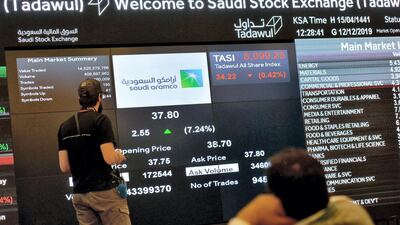The amount of money raised by Middle East firms on equity markets increased almost five-fold last year to the highest level ever recorded as Saudi Aramco made its record-breaking market debut in December, new data shows.
The 2019 Mena Investment Banking Review by financial data company Refinitiv shows that $27.4 billion (Dh94bn) was raised on Mena equity markets last year, with the Aramco IPO accounting for $25.6bn of this - although a "greenshoe" option exercised this month takes the eventual amount even higher, to $29.4bn.
Debt capital markets had their second-highest year on record, up 12 per cent on 2018 at $98.5bn, while the mergers and acquisitions market hit its highest level since 2007 as deals with an aggregate value of $130.1bn were carried out - a 127 per cent year-on-year increase. Saudi Aramco once again played a major part in this via ts $69.1bn acquisition of a 70 per cent stake in Saudi Basic Industries Corporation from the Public Investment Fund in March.
Although the Aramco-related activity is the type of event that only occurs “once every blue moon”, it gives something to build on this year, according to Mohammed Fahmi, head of investment banking at EFG Hermes.
He anticipates continued IPO activity in the Saudi market this year, as part of an Aramco-related "overhang”.
“You had a lot of good Saudi offerings that could have come to the market but did not as everyone was waiting for Aramco,” he said, citing Sulaiman Al-Habib Medical Centres Group and retail group BinDawood as two companies that are expected to make market debuts.
“I think these are potentially two relatively sizeable IPOs that … irrespective of whether they are local or international IPOs I think they will garner a very strong demand.”
He also expects the bull-run in merger and acquisition (M&A) activity to continue, driven in the UAE by consolidation not only in banking, but also healthcare, education and other fragmented sectors.
“I also think we will see M&A driven by financial sponsors flush with liquidity, seeing it as a buyers’ market and looking to capitalise on distressed opportunities.”
In Saud Arabia, he expects greater inbound M&A activity as foreign companies look to participate in under-invested industries like healthcare, education and tourism. He adds a caveat, though, that any escalation in geopolitical tensions would curtail investor activity.
The region is expected to witness "robust cross-border, intra-regional and domestic investment activity, throughout 2020", said Gareth Thomas, regional head of global banking at HSBC. "Areas such as energy transition, fiscal targets and hydrocarbon value chain integration will drive activity. Consolidation is also likely to continue, particularly in both the banking and healthcare sectors," he added.
The fees earned by investment bankers in the region increased by 12 per cent last year to an estimated $1.2bn, Refinitiv said - the highest in over a decade. Advisory fees earned on M&A deals were up 84 per cent, and fees from equity capital market deals increased 95 per cent.
Demand for investment bankers remains healthy, recruitment firm Michael Page said.
Alongside the mega-deals such as the Saudi Aramco IPO, “investment bankers are in demand to advise on the increasing number of mergers and acquisitions and joint ventures occurring in the kingdom”, said the firm's senior consultant Ahmed Elghatas.
But although these posts are well-remunerated, investment banks in Saudi Arabia face competition for staff.
“Other entities [sovereign wealth funds, newly established government entities or family holding groups] tend to pay higher salaries but lower bonuses, while in investment banks, the salaries are conservative but bonuses are generous,” Mr Elghatas said.
In the UAE, however, salary expectations of investment bankers are not necessarily matched by those offered at sovereign funds or other buy-side institutions, meaning these organisations tend to recruit staff from London, Singapore and other financial centres, said Michael Page's senior director Adam Man-Cheung.
"There are, of course, some regional investment bankers who have made the move, even some who have adjusted their pay expectations downwards after forming a realistic assessment of buy-side opportunities in the region," he added.
Salaries in the biggest investment banks in the UAE can range from about $350,000 per year for an associate up to $1m a year at managing director level, he added.


